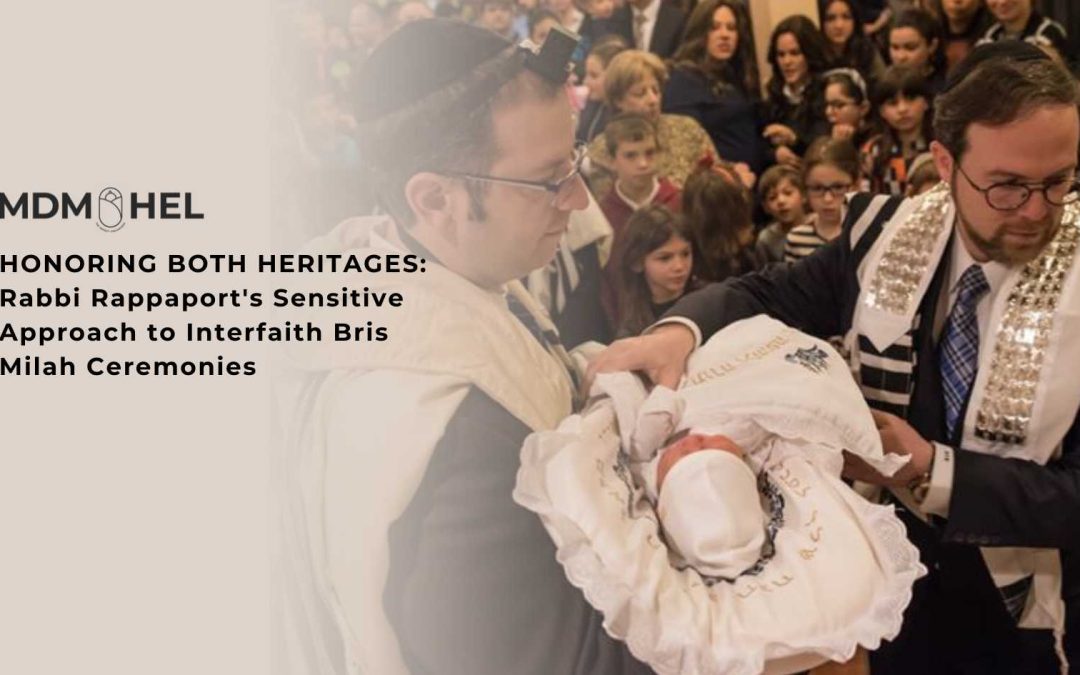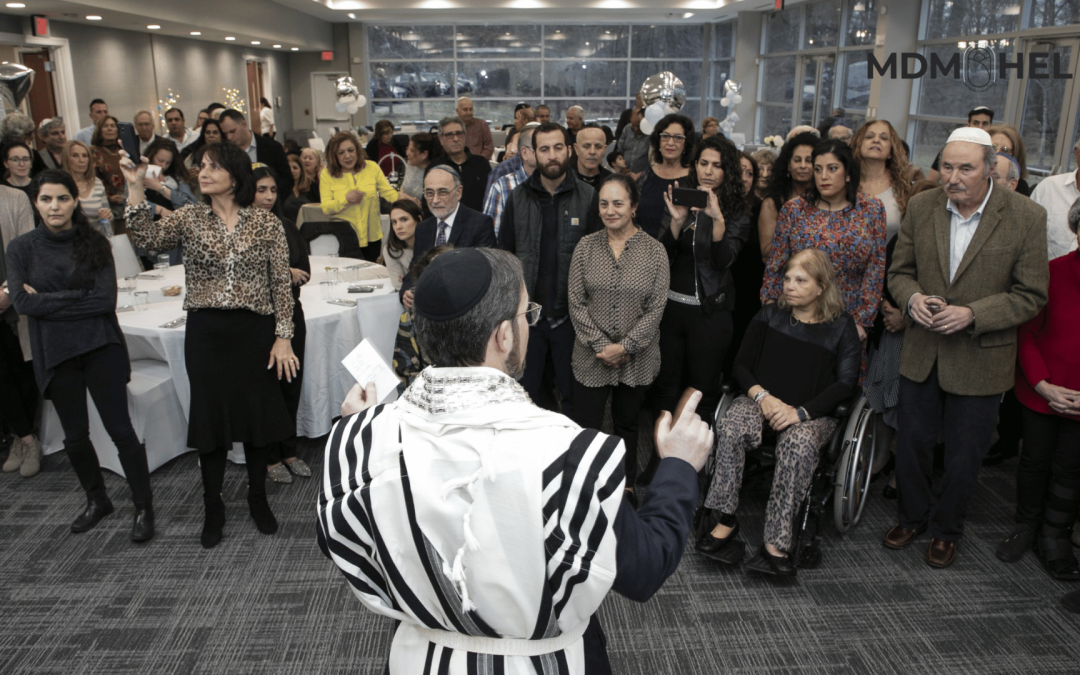Choosing a Hebrew name for your son is a deeply meaningful journey that weaves together faith, tradition, family heritage, and your hopes for his future. This age-old practice, filled with spiritual significance, allows parents to honor loved ones, embrace Jewish identity, and connect with a rich history.
Rabbi Rappaport shares thoughtful insights from his unique perspective as a Maryland mohel to help you choose a Hebrew name that carries profound meaning and becomes an integral part of your child’s life story.
Naming is the Final Step of the Bris Ceremony
The Bris ceremony, a cornerstone of Jewish tradition, is a profoundly spiritual event that marks a baby boy’s covenant with G-d through circumcision. The ceremony is rich with meaning and structure, culminating in its third and final part: the naming ceremony.
Following the ritual circumcision and prayers, a blessing is recited over a cup of wine, symbolizing joy and sanctity. At this moment, the baby formally receives his Hebrew name, an act imbued with immense significance. This name marks his introduction to the Jewish community and connects him to his family’s history, values, and spiritual heritage.
Parents often place great importance on this step of the ceremony, carefully selecting a name that reflects their hopes and dreams for their child. The naming ceremony concludes the Bris, leaving a lasting spiritual imprint as the child embarks on his journey within the Jewish faith.
Rabbi Rappaport’s blessing, recited during this part of the ceremony, encapsulates the depth of this act. It emphasizes the unique role every individual plays in the world and the profound significance of a name in shaping a person’s identity and purpose. Here is an excerpt of the blessing, spoken with sincerity and devotion during the ceremony:
“Our G-d and G-d of our ancestors, let this child’s name in Israel be called (baby’s Hebrew name), son of (father’s Hebrew name) and (mother’s Hebrew name). Every person born into this world represents something new that never existed before, something special and unique. Using all of his G-d-given capabilities, every single person in this universe is called upon by G-d to fulfill his particular mission in the world. A child’s name reflects this unique identity and plays an integral role in shaping the person this child will become. May it be the will of G-d that (baby’s name) succeed in living up to his responsibilities, leaving his indelible mark in this world through his personal contributions. May we all derive pleasure and joy from this child, and may G-d endow (mother’s English name) and (father’s English name) with understanding and love so they may raise their son with the ability and desire to achieve his potential and raise him to be learned, righteous, and kind.”
(Not to be disseminated or copied.)
This beautiful blessing underscores the timeless belief that a name is far more than a label—it reflects the child’s soul, potential, and unique place in the world. The blessing also serves as a prayer for the child’s growth and success and a call for the parents to nurture their son with wisdom and love. It is a moment of profound spiritual connection, leaving an indelible mark on the hearts of all who witness it.
Names as the Essence of a Person: Lessons From Genesis
In Jewish tradition, a name is much more than a label. This profound concept has its roots in the book of Genesis, where Adam, the first human, is tasked with naming the animals:
“And man named all the cattle and the fowl of the heavens and all the beasts of the field, but for man, he did not find a helpmate opposite him.” (Genesis 2:20)
According to rabbinic interpretation, Adam did not merely assign random names; he perceived the intrinsic essence of each creature and gave it a name that reflected its unique character and purpose. This act demonstrates the power and significance of naming as a way to capture and define identity.
The Significance of a Name: Honoring Tradition and Meaning
Choosing a Hebrew name for your son is an opportunity to honor heritage, connect with meaningful traits, and infuse your child’s identity with intention. Many names are chosen for their rich meanings or connection to religious figures embodying specific virtues.
Each name reflects not only the parents’ values and aspirations but also the unique identity and potential of the child. It is a tradition that bridges the past with the future, linking the child to their roots while shaping their destiny.
How to Choose the Perfect Hebrew Name for Your Son
- Honor Family Members: Many families choose to name their child after a loved one who has passed away, carrying forward the traits and legacy of that individual.
- Connect With Religious Figures: Religious names often hold timeless appeal, offering a connection to the virtues of figures like Joseph, who exemplified resilience, or Aryeh, symbolizing courage.
- Reflect on Personal Values: Choose a name that resonates with your hopes for your child, such as kindness, justice, or growth.
- Consider the Time of Year: Seasonal and holiday-inspired names, such as Judah for Hanukkah or Mordecai for Purim, can provide an additional layer of significance.
Honoring Loved Ones Through Naming Traditions
One of the most heartfelt naming practices in Jewish tradition is naming a child after a loved one who has passed away. This act honors the memory and virtues of the deceased, allowing their legacy to live on in the child.
For example, a baby named Aaron might carry the compassionate spirit of a beloved grandfather, while a child named after a respected rabbi or community leader may inherit the inspiration of their wisdom and values.
This tradition preserves the names of cherished individuals and imbues the child with a sense of connection and continuity within the family.
Seasonal and Holiday-Inspired Names for Your Son
When selecting a Hebrew name for your son, the time of year can offer inspiration. Names associated with specific religious holidays or seasons often carry rich cultural and spiritual meaning.
- Hanukkah: Names like Judah (after Judah Maccabee) connect to the holiday’s themes of bravery and perseverance.
- Purim: Mordecai or Esther (traditionally a female name) honor the Purim story’s heroes.
- Passover: Moses, the leader who brought freedom to the Israelites, is a timeless choice.
Popular Hebrew Names and Their Deeper Meanings
Some Hebrew names have endured as favorites due to their profound meanings and strong connections to Jewish heritage:
- Chaim (Life): A symbol of vitality and resilience.
- Joseph: Known for his ability to overcome challenges and rise to greatness.
- Abraham: Embodies kindness and generosity.
- Aaron: Associated with peace and harmony.
Modern Trends in Hebrew Names for Boys
In recent years, Hebrew names for boys have seen a blend of tradition and innovation. While many parents still honor family members and religious figures, others are embracing modern interpretations and dual names to reflect contemporary values and circumstances:
- Dual Names: Adding a second name has become more common, often to honor multiple individuals or to adjust the spiritual energy associated with the name.
- Unique Meanings: Parents are increasingly drawn to names that reflect qualities such as love, growth, or justice.
- Nature-Inspired Names: Names like Aryah (lion) or other animal-related names are gaining popularity for their symbolic meanings.
- Angelic Names: Names of angels, reflecting divine protection and guidance, are also becoming a modern trend.
Families Trust Rabbi Rappaport for This Special Occasion!
Thousands of grateful families recommend Rabbi Rappaport as the ideal Mohel for the perfect Bris Milah ceremony! Ensure peace of mind and a perfect outcome with a trusted expert. Reach out now and take the first step towards ensuring your child’s circumcision is perfect. We also invite you to read or write a review of your experience with Rabbi Rappaport!
Let Rabbi Rappaport do the job if you plan to organize a ritual circumcision for yourself or your child. Contact him anytime on his cell at (443) 790-6541. You can also send him an email at rabbi@mdmohel.com or visit his website. He will be happy to support you in making sure you have a perfect experience!







